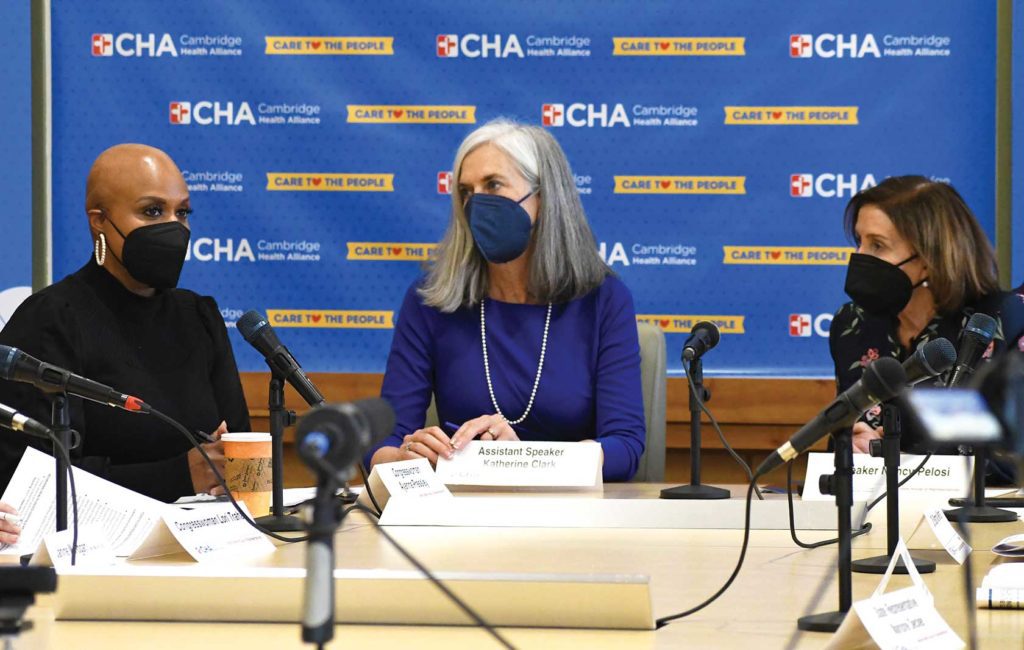Pelosi discusses children’s mental health
Joins Pressley, Clark for chat at Cambridge Health Alliance

Speaker of the U.S. House of Representatives Nancy Pelosi and members of the Massachusetts Congressional delegation, including Congresswoman Ayanna Pressley, met with staff from the Cambridge Health Alliance (CHA) Saturday to discuss behavioral health care and hospital staffing, in an event billed as a roundtable about the impact of the American Rescue Plan (ARP) on health care.
At the roundtable, Pressley said she was especially concerned about the ongoing impacts of the pandemic on the behavioral health of children.
“I continue to be very concerned that, although we have made great strides in combatting the pandemic, that the second pandemic will be trauma, will be mental and behavioral health challenges, particularly for the 140,000 children [nationwide] — disproportionately Black and Brown — who have lost a parent, a grandparent or a caregiver during this pandemic,” Pressley said. “The greatest wealth of our commonwealth is the health of our people, certainly our most vulnerable.”
Janine Hogan, nurse manager at the CHA Cambridge Campus Emergency Services, said the stressors of the COVID-19 pandemic only add to an existing struggle to find inpatient beds in hospitals, calling the situation dire.
“We have seen that the struggles of the pandemic have given the children and the adolescents no bandwith to tolerate one more stressor,” Hogan said. “And so they’re showing up at the emergency department; they’re here for days, they’re here for hours.”
Many children, Hogan said, remain in the emergency department for days before an inpatient bed opens up. In a given month, she said, her department sees 25 to 50 adolescents waiting for beds. According to Hogan, in February, the median waiting time for an inpatient placement was 4.5 days; last week, an adolescent waited 15 days in the emergency department before being transferred to an inpatient bed.
The long wait times can cause further issues even once they enter inpatient settings, said Sharmila Mehta, director of child and adolescent inpatient psychology at CHA.
“We have children between 3 and 17 years old who have been waiting in the ERs for extraordinarily long periods of time, and just that length of disruption to normal developmental routines when you’re already in a crisis, so you already have the disruption of the pandemic, and then you have the added disruption of this time waiting for care,” Mehta said.
She said the results often show up as aggression, desperation, depression and self-injurious behavior.
“You know, each child has their own picture, and then they all come together,” Mehta said. “In the unit you’re experiencing just this wildfire of pain and suffering, and the predominant presentation is that of trauma — always has been, even before the pandemic.”
Jacob Venter, division chief of child and adolescent psychiatry at CHA, said he recently worked with an adolescent who had spent three months in another facility before being admitted to an inpatient bed at CHA.
“Imagine being a parent and sitting in the emergency room, and the child’s life is on hold for that time,” Venter said. “There’s really nothing happening in the emergency room.”
Assaad Sayah, CEO of the Cambridge Health Alliance, said he hopes that the addition of 69 adolescent psychiatric beds at Somerville Hospital will help address the struggle. CHA plans to open its first unit for psychiatric care for children this week.
Staff shortage
Beyond behavioral health, the CHA staff said they’ve been facing challenges with staffing. Venter called the workforce challenges “enormous,” especially due to the large amounts of trauma faced by everyone in the early days of the COVID-19 pandemic.
“We went through a period when COVID started, and then we had George Floyd, and it was just so much trauma that was happening to everyone during that time,” Venter said. “Really, I’m at a bit of a loss as to how do we get to the emotional support for our staff. I think that’s going to be so important, because if you are not in a good space, how can you take care of this very, very difficult case?”

Speaker of the U.S. House of Representatives Nancy Pelosi during the roundtable discussion. PHOTO: AVERY BLEICHFELD
Hogan said that she’s seeing fewer nurses — as well as other roles like technicians, housekeepers and dietary staff —due to both trauma from the pandemic and a general cultural shift.
“I feel the generations have kind of gone away from nursing, even though we’re well-respected,” Hogan said. “They think of the bedside nurse or the inpatient nurse more as a steppingstone to be in primary care, to be in plastic surgery as a NP or whatever.”
Sayah said that as health centers do this work, it’s important the staff they hire and the ways they engage with the community reflect the diversity of the people they serve.
“Community workers that look and sound like the people they’re working with — that’s very important in the future, in all industries, particularly in healthcare,” Sayah said. “And we need to move in that direction — there’s no question about it — because building trust is absolutely critical moving forward, and that’s the way we slowly build that level of trust.”
Pelosi said that level of trust is especially important in light of the effects of the COVID-19 pandemic.
“We sort of knew, but there was no denying after seeing how the pandemic hit,” she said, “that it hit places disproportionately — Black, brown, whatever — and, again, revealed what should have been self-evident, but was clear to anybody who cared to know the truth: that we had to address these issues in a culturally and linguistically appropriate way, and that anything less than that is a disservice.”






